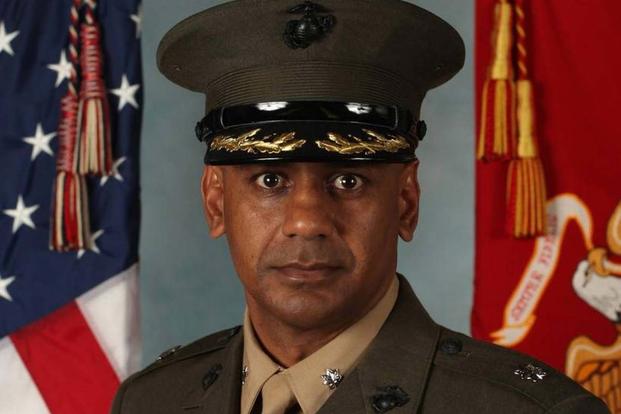QUANTICO, Virginia -- After 20-year-old recruit Raheel Siddiqui died last March in an apparent suicide at boot camp, Marine Corps investigators found that his rough treatment at the hands of a senior drill instructor "likely provided the impetus" for the tragic act.
But authorities at Marine Corps Recruit Depot Parris Island, South Carolina, had already linked the same drill instructor, since identified as Gunnery Sgt. Joseph Felix, to disturbing accusations of hazing a year prior, allegedly involving another Muslim recruit who was stuffed into an industrial dryer and interrogated.
Now, the commander of 3rd Recruit Training Battalion, Lt. Col. Joshua Kissoon, may face criminal charges for failing to keep Felix from training recruits while the first investigation was ongoing.
Kissoon was removed from his post March 31, 2016. While the firing came just weeks after Siddiqui's death, it was unrelated to that tragedy. Instead, officials say, it was connected to prior allegations, including an Inspector General report finding evidence of whistleblower retaliation.
Kissoon faces charges of failure to obey a lawful order, two specifications of willful dereliction of duty, three specifications of false official statement, and six specifications of conduct unbecoming an officer.
Col. Paul Cucinotta, the former commander of Parris Island's Recruit Training Regiment, which oversees all four training battalions, testified during an Article 32 preliminary hearing Monday that he had given a directive to move Felix and two other accused drill instructors to non-training duties until the investigation into the dryer incident was completed.
Both Cucinotta and his senior enlisted adviser, Sgt. Maj. Nicholas Deabreu, were removed from their posts in the wake of Siddiqui's death and subsequent allegations of hazing. Both testified for the prosecution Monday under a grant of immunity.
Cucinotta said he had intended to keep accused drill instructors away from training, given the egregious nature of the allegations, expressing his wish in a meeting at which Kissoon was present.
"I said something along the lines of, 'These Marines will not go back on the deck in terms of leading a platoon until the investigation is complete,' " Cucinotta said.
A Jan. 24, 2016, email update from Cucinotta's executive officer, Lt. Col. Christopher Lynch, reiterated this recommendation. Lynch had read a draft copy of the investigation and confirmed the allegations were serious.
"The drill instructors should be sat down," Lynch wrote, according to testimony at the hearing.
Cucinotta said he didn't recall specifically if at that point he had ordered the drill instructors implicated in the case to surrender their belts and campaign covers, the distinctive markers of their position.
"I had already resolved in my head that they were not training recruits," he said.
Initially, Felix was placed in an administrative post within 3rd Battalion. But he was eventually installed as a senior drill instructor with the battalion's Kilo Company, according to testimony.
Cucinotta said he did not become aware that Felix was training recruits again until the day after Siddiqui's death, when he met the drill instructor at the battalion and spoke with him.
There were several points of ambiguity raised during the hearing. One was an email from Deabreu that appeared to suggest there was not enough evidence to prosecute the drill instructors in the hazing probe, raising the possibility they would receive only an adverse administrative counseling, known in the Marine Corps as a 6105.
Another was the definition of "sat down" with regards to the drill instructors. Deabreu said it wasn't clear the term always entailed removing the Marines from their posts, although he said a DI who had been "sat down" should not be supervising Marines.
Kissoon's civilian attorney, Colby Vokey, also noted that drill instructors were in chronically short supply at Parris Island, establishing in testimony that Kissoon had asked for regular updates on the hazing investigation because of the impact it had on unit manning.
Cucinotta described Kissoon as a proficient officer who cared about his Marines and communicated with him regularly about the welfare of 3rd Recruit Training Battalion.
After Siddiqui's death, Cucinotta said he confronted Kissoon frankly about his decision to reinstate the drill instructor.
"I asked him, why didn't we talk about that," Cucinotta recalled. "[Kissoon] said, 'Had we talked about that, I would have tried to convince you to let [Felix] come back.' "
The hearing into allegations against Kissoon continued into Monday evening. Once it is complete, the preliminary hearing judge, Col. William Brown, will make a decision whether to recommend sending the charges to court-martial or to dispense of the case some other way.
Felix is set to face court-martial this summer at Camp Lejeune, North Carolina, on charges including hazing, maltreatment, and drunk and disorderly conduct.
-- Hope Hodge Seck can be reached at hope.seck@military.com. Follow her on Twitter at@HopeSeck.




























